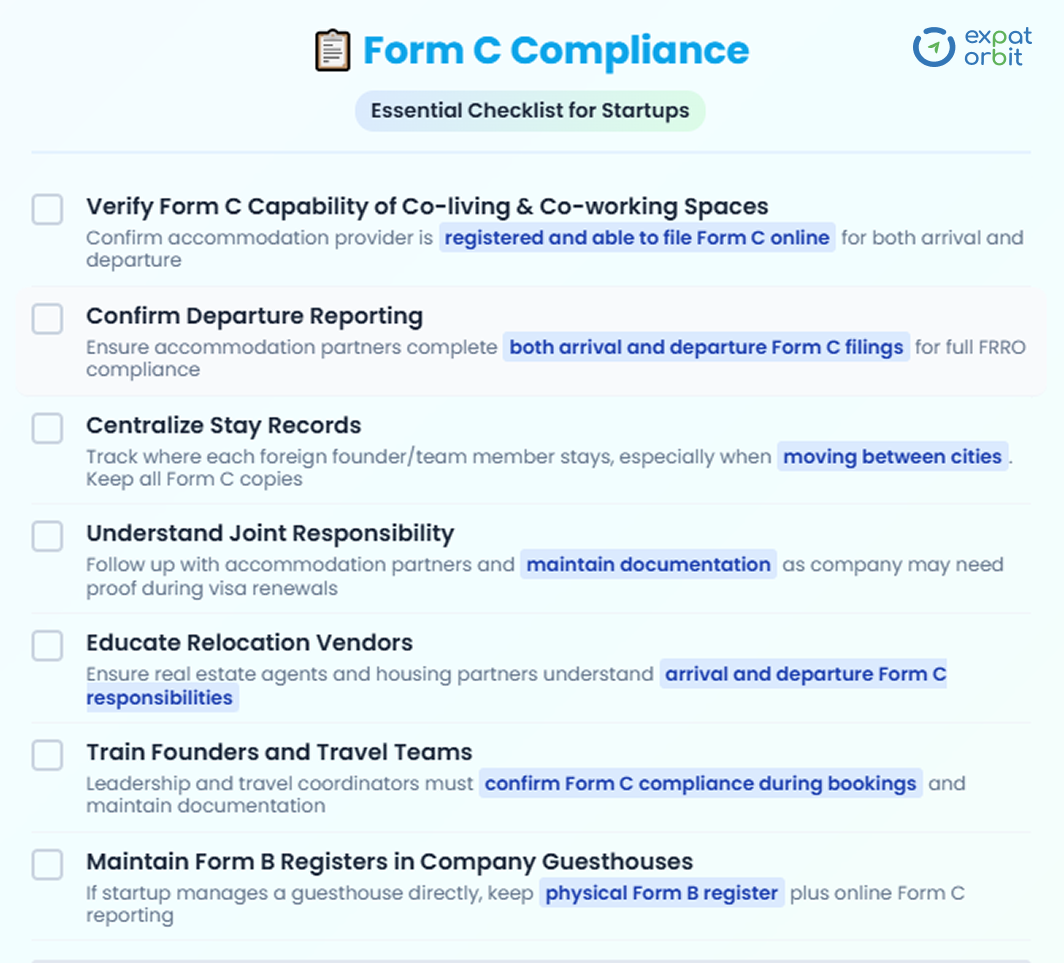Form C Compliance for Startups: What Foreign Founders in India Must Know

Introduction
India’s vibrant startup ecosystem increasingly attracts foreign founders, cross-border advisors, and international team members. These individuals often use co-working residences, serviced apartments, or company-arranged temporary housing during their initial setup and market entry phases.
However, a crucial legal requirement is often overlooked: Accommodation providers including co-working residential spaces, guesthouses, and serviced apartments must submit Form C to the Bureau of Immigration within 24 hours of a foreign guest’s check-in. This compliance step is vital for both the accommodation provider and the startup employing foreign nationals.
Startups frequently miss this obligation, especially when using flexible housing options or short-term vendor arrangements
Why Form C Matters for Startups and Foreign Founders
Startups often:
- House foreign founders in co-working residences or shared guesthouses without checking immigration reporting procedures.
- Rapidly change cities for fundraising, product launches, or team-building, with minimal mobility oversight.
- Use serviced apartments and temporary rentals that may not consistently file Form C.
Failure to comply with Form C can result in:
- Immigration scrutiny for both the accommodation provider and the foreign founder.
- Disruption of visa renewals or re-entries.
- Legal penalties and reputational risks for the startup.
Key Compliance Updates for Startups
- Departure Reporting Requirement:In some regions (notably Chennai and increasingly elsewhere), accommodation providers must file Form C within 24 hours of a foreign guest’s departure, in addition to arrival (Check the update below).
- Joint Responsibility:While the primary responsibility for Form C filing lies with the accommodation provider, if the provider fails, the compliance burden can shift to the company employing the foreign national. FRROs may require the company to explain failures or provide proof of submission during visa renewals or registrations.
- Form B Register Clarification:If a startup directly manages a guesthouse, it must maintain a physical Form B register in addition to submitting Form C online. The Form B register is an extra record-keeping requirement and does not replace the mandatory online Form C submission.
Form C Compliance Update 2025: Mandatory Departure Reporting Now Required
With the implementation of the Immigration and Foreigners Rules, 2025, notified by the Ministry of Home Affairs (MHA), the compliance requirements for Form C reporting in India have been expanded. Earlier, accommodation providers were responsible only for reporting the arrival and stay of foreign nationals. Now, the scope has been extended to include departure or checkout reporting as well, marking a significant regulatory enhancement in India’s immigration compliance framework.
This update underscores the government’s intent to create end‑to‑end tracking of foreign nationals through a centralised digital system managed by the Bureau of Immigration. By capturing accurate data from entry to exit, the new rules ensure that every visit is completely recorded. The move makes Form C compliance more comprehensive and technology-driven, helping authorities maintain an updated record of all foreign nationals staying in India.
What Has Changed Under the 2025 Rules?
Under the Immigration and Foreigners Rules, 2025, foreign nationals who are required to register in India must also ensure that their departure is reported to the concerned Registration Officer (FRRO/FRO) before they leave the country. The Rules are designed around a technology-enabled, online compliance system, using the Form C online portal and authorised digital platforms.
In practice, this means:
- Where the foreign national’s place of stay has been registered through Form C, the obligation to report applies both at arrival/check‑in and at departure/check‑out from that address and from India.
- The objective is to ensure that immigration records are properly closed, and there are no “open” or incomplete entries in the system when the foreigner exits India.
Role and Responsibilities of Hosts and Accommodation Providers
Hotels, guesthouses, serviced apartments, corporate housing providers, hospitals, educational institutions, and other entities hosting foreign nationals continue to play a central role in immigration compliance. While the primary obligation to report departure rests with the foreign national, hosts are expected to facilitate and support this process, particularly where Form C registration has been completed through their establishment.
Hosts should ensure that:
- Departure details are accurately updated in the registration records
- The actual or intended date of departure is correctly recorded
- Any required confirmation of exit or closure of registration is completed where applicable
By doing so, hosts help ensure that immigration records remain current, complete, and compliant with the 2025 Rules.
Why Departure Reporting Is a Critical Compliance Requirement
Historically, Form C compliance focused largely on reporting the arrival and stay of foreign nationals. The 2025 Rules adopt a more comprehensive compliance approach by explicitly recognising the importance of departure reporting as an integral part of immigration monitoring.
For hosts and establishments, failure to ensure proper departure reporting may result in:
- Incomplete or open immigration records
- Increased regulatory scrutiny or inspections
- Potential penalties or adverse compliance findings
- Complications during future visa applications or registrations involving the same foreign national or host entity
Timely and accurate departure reporting helps close the compliance loop, reducing legal exposure and demonstrating proactive adherence to evolving immigration regulations.
What Startups Must Do to Ensure Form C Compliance

- Verify Form C capability of co-living and co-working spaces:Confirm that the accommodation provider is registered and able to file Form C online for both arrival and, where required, departure.
- Confirm departure reporting:Ensure your accommodation partners are completing both arrival and departure Form C filings for full compliance with local FRRO requirements.
- Centralize stay records:Track where each foreign founder or international team member is staying, especially when moving between cities. Keep copies of all Form C filings for company records.
- Understand joint responsibility:Proactively follow up with accommodation partners and maintain documentation of all Form C submissions, as the company may be asked to provide proof during visa renewals or registrations.
- Educate relocation vendors:Ensure that real estate agents and temporary housing partners understand both arrival and departure Form C responsibilities.
- Train founders and travel teams:Startup leadership and travel coordinators must proactively confirm Form C compliance during housing bookings and maintain documentation for visa or FRRO processes.
- Maintain Form B registers in company-managed guesthouses:If the startup directly manages a guesthouse, a physical Form B register must be kept in addition to online Form C reporting.
Action Points for Startups
- Confirm with accommodation partners that both arrival and departure Form C filings are being completed.
- Regularly review local FRRO requirements for any updates on reporting obligations.
- Maintain copies of all Form C submissions for company records.
- Proactively follow up with accommodation providers to ensure timely and accurate compliance.
- Educate internal teams and relocation vendors about both arrival and departure reporting responsibilities.
Final Takeaway
For startups, where agility is key and cross-border mobility is frequent, Form C compliance can easily fall through the cracks but has serious immigration implications.
Building Form C verification into housing selection, vendor contracts, and travel planning is essential to protect foreign founders and international teams from legal exposure.
Need help navigating FRRO registration, Form C filing, or visa compliance in India?
Connect with our immigration experts for personalized guidance and ensure your startup stays compliant with all FRRO requirements.
